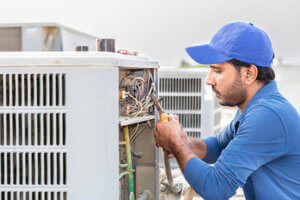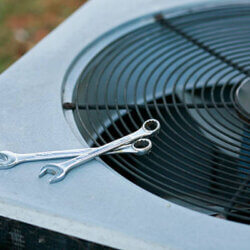
HVAC lines inevitably suffer wear and tear over time. As a result, the refrigerant they contain can leak out. You will then need to identify the source of the leak, perform repair, and refill the unit with refrigerant to the appropriate level. Sometimes, an AC refrigerant leak is discovered only after noticeable signs. At this point, quite a bit of refrigerant may have escaped, adding to the recharge cost. If you suspect that your AC is leaking refrigerant, get in touch with our heating and air conditioning professionals for timely repair and refill.
Given how leaking AC refrigerant can affect your indoor comfort not to mention drive up your cooling costs, knowing the red flags is important. Have a look at some common signs.
How to Identify an AC Refrigerant Leak Quickly
- Indoor air feels funny: This can manifest in a couple of different problems:
- When you are expecting that familiar cool blast of air when you switch on your AC but are greeted with warm air instead, it could signal a problem with the refrigerant.
- During the hottest hours of the day, a properly working air conditioner keeps your indoors at the desired temperature. If your home feels unusually warm, leaking refrigerant may be the culprit.
- Air conditioners dehumidify indoor air to some extent, although this is not their primary function. Humid indoor air should also raise your suspicion about a possible AC refrigerant leak.
- Noisy outdoor AC unit: Your AC’s refrigerant is constantly under high pressure. When it leaks, it will make hissing sounds. The refrigerant lines can also make a bubbling sound when air bubbles enter them and occupy the space left by depleting liquid refrigerant. Your outdoor unit should not hiss or bubble when it is not running. Both sounds are unmissable, so pay attention and have our technicians investigate the leak.
- High utility bills: An AC refrigerant leak that goes undetected for several days can hit you financially. When your air conditioner is not getting sufficient refrigerant, it will consume more energy to maintain the same runtime, reflecting in higher-than-usual energy bills. Along with longer cycles, you may also deal with inefficient cooling. One or both signs should prompt you to seek professional help.
- Freezing AC line: Ice crystals on evaporator coils are an unmistakable sign of depleting AC refrigerant. Refrigerant can get too cold when it is in smaller amounts due to a leak. This causes the evaporator coil to freeze, and in turn, the moisture in the surrounding air also freezes.
A clogged or dirty air filter, closed supply vents and blocked return vents can also cause ice build-up. Along with an AC refrigerant leak, these issues are generally caught during annual AC tune-ups and fixed before they become bigger problems. That said, knowing the telltale signs of leaking refrigerant will allow you to act as quickly as possible.
Should You Patch and Recharge Your AC or Replace It?
In most cases, refrigerant leaks can simply be repaired and the AC recharged. However, if the AC refrigerant leak is due to an aging system, replacing your old AC may be ideal to avoid the recurring costs of repair and recharge. Your problem will mount if your AC gives up on you in July, when St. Louis records its highest temperatures!

When you suspect a problem with your AC refrigerant, you can be sure of receiving honest advice from the heating and air conditioning professionals at Galmiche & Sons. We are happy to speak to you over the phone. Alternatively, you can proceed to request a quote for HVAC maintenance and service online.









